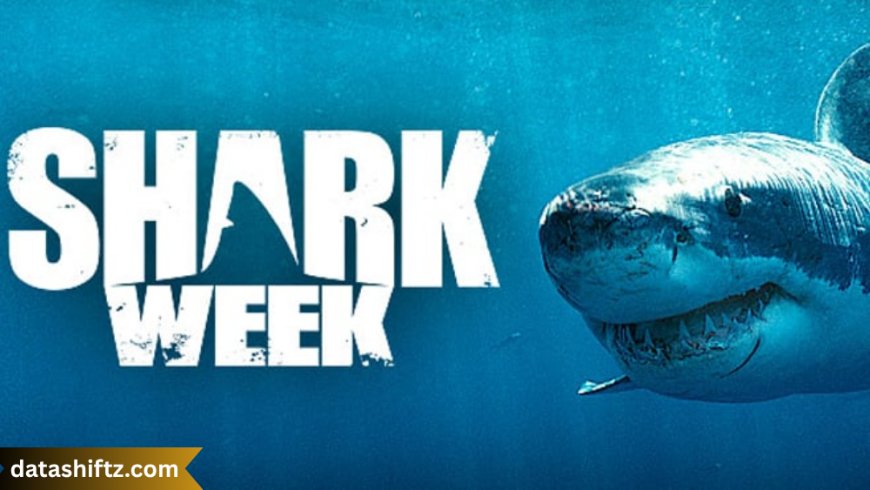Shark Week – A Deep Dive into the Ocean's Most Exciting Television Event

Introduction
Every year, television audiences around the globe plunge into the depths of the ocean in awe, fear, and fascination with the ocean’s apex predators—sharks. This phenomenon is none other than Shark Week, a weeklong television event dedicated to showcasing shark-centric content. First launched in 1988 by the Discovery Channel, Shark Week has grown from a niche summer feature into a global television staple that attracts millions of viewers annually.
But Shark Week is more than just jaw-dropping footage and suspenseful narratives. It has become a platform to educate the public, raise awareness about shark conservation, debunk myths, and foster a sense of respect for one of nature’s most misunderstood creatures. In this 1500-word article, we’ll explore Shark Week’s origins, its cultural impact, memorable episodes, conservation efforts, and how viewers can make the most of the experience.
The History and Evolution of Shark Week
How It All Began
Shark Week premiered on July 17, 1988, with the primary goal of helping people better understand sharks and correcting the false perceptions popularized by movies like Jaws. The idea was simple: create a week of programming dedicated entirely to sharks, blending education and entertainment.
Over the years, Shark Week transformed into a pop culture sensation, drawing celebrities, scientists, conservationists, and adventurers to its programming.
Key Milestones in Shark Week History
| Year | Event |
|---|---|
| 1988 | Shark Week debuts on Discovery Channel |
| 1995 | First use of computer animation in shark documentaries |
| 2001 | Shark Week celebrates its 100th episode |
| 2010 | Jimmy Buffett writes a theme song for Shark Week |
| 2013 | First Shark Week programming available on streaming platforms |
| 2015 | "Shweekend" mini-series introduced |
| 2020 | Dwayne "The Rock" Johnson hosts a segment and drives ratings to new highs |
| 2023 | Shark Week celebrates its 35th anniversary |
Shark Week’s Educational and Cultural Impact
Raising Awareness Through Entertainment
Shark Week is not just a binge-worthy series of shows. It has helped spread awareness about marine biology, conservation, and ocean ecosystems. By turning scientific research into engaging television, the event has educated millions about sharks’ essential role in the ocean’s food chain.
Debunking Myths
Many people fear sharks, largely due to sensationalized portrayals. Shark Week takes on this challenge by presenting facts over fiction, explaining why most sharks are not dangerous to humans and how unprovoked attacks are extremely rare.
Cultural Relevance
Shark Week has become a mainstay in popular culture. From Twitter memes and TikTok trends to Shark Week parties and merchandise, the event has created an entire ecosystem of fanfare. Celebrities like Shaquille O’Neal, Mike Tyson, and Will Smith have made appearances, helping bridge the gap between marine science and mainstream entertainment.
Common Shark Myths Debunked by Shark Week
-
Myth: Sharks are mindless killing machines.
Fact: Most shark species are not dangerous to humans. -
Myth: All sharks are large.
Fact: Many shark species are under 3 feet in length. -
Myth: Sharks don’t get cancer.
Fact: While rare, sharks can indeed get cancer. -
Myth: Sharks are attracted to human blood.
Fact: Sharks are attracted to fish blood, not specifically human. -
Myth: Sharks have poor eyesight.
Fact: Most sharks have excellent vision, especially in low light.
Programming Highlights and Fan Favorites
Notable Episodes and Specials
Each year, Discovery Channel and now Max (formerly HBO Max) deliver a mix of thrilling shark attacks, conservation documentaries, celebrity specials, and scientific discoveries.
Some of the most popular Shark Week specials include:
Fan-Favorite Shark Week Episodes
-
Air Jaws – Captures Great White Sharks leaping out of the water in pursuit of prey.
-
Megalodon: The Monster Shark Lives – A fictional yet entertaining “mockumentary.”
-
Shark After Dark – A talk-show-style recap featuring experts and comedians.
-
Sharkageddon – A look at the increasing presence of sharks near Hawaii.
-
Shaq Does Shark Week – NBA legend Shaquille O'Neal faces his fears.
-
Tyson vs. Jaws: Rumble on the Reef – Mike Tyson “fights” a shark in a humorous, educational episode.
-
Great White Serial Killer – A series analyzing patterns of shark attacks in a single location.
-
Alien Sharks – Features the weirdest, most alien-like shark species from deep waters.
Common Types of Sharks Featured in Shark Week
| Shark Type | Description | Notable Appearance |
|---|---|---|
| Great White Shark | Iconic predator known for breaching behavior | Air Jaws |
| Tiger Shark | Aggressive and curious; stripes fade with age | Tiger Beach specials |
| Hammerhead Shark | Distinctive head; uses it for hunting | Alien Sharks |
| Bull Shark | Thrives in freshwater and saltwater | Great White Serial Killer |
| Mako Shark | Fastest shark species | Return of the Mako |
| Whale Shark | Largest fish in the world; harmless filter-feeder | Whale Shark specials |
Shark Conservation and Advocacy
Environmental Impact and the Role of Sharks
Sharks play a vital role in maintaining the health of marine ecosystems. As apex predators, they help regulate species populations and ensure ocean biodiversity. Yet, millions of sharks are killed each year due to overfishing, finning, and bycatch.
Shark Week's Conservation Message
Many Shark Week specials now focus on shark preservation, often partnering with organizations such as:
-
Oceana
-
Shark Allies
-
Marine Conservation Institute
-
WildAid
-
The Shark Trust
Ways Viewers Can Support Shark Conservation
-
Avoid products made with shark fins or cartilage.
-
Support sustainable seafood choices.
-
Donate to marine conservation organizations.
-
Educate others about sharks and their importance.
-
Participate in local beach cleanups.
-
Reduce single-use plastic consumption.
-
Advocate for marine-protected areas.
How to Watch and Participate in Shark Week
Viewing Options
Shark Week airs on the Discovery Channel and is also available on streaming services like Max (formerly HBO Max), Discovery+, and selected clips are available on YouTube and social media platforms.
Interactive Content
With the rise of social media, Shark Week has also become highly interactive:
-
Live Tweeting episodes
-
Instagram Reels with shark trivia
-
Virtual reality shark dives
-
Behind-the-scenes content with marine biologists
Hosting a Shark Week Party
Celebrating at home? Here are some ideas:
Shark Week Party Essentials
-
Shark-themed decorations (balloons, banners)
-
Ocean-inspired snacks (blue punch, fish-shaped cookies)
-
Shark trivia games
-
Screening of favorite episodes
-
DIY cardboard shark photo booth
Fun Shark Week Facts
-
Over 30 million Americans tune in to Shark Week annually.
-
Shark Week is broadcast in over 70 countries.
-
The Discovery Channel has produced over 200 shark specials.
-
The #SharkWeek hashtag trends globally every year.
-
Some Shark Week stars are actual marine scientists, not just TV personalities.
Conclusion
Shark Week is a captivating blend of education, entertainment, and advocacy. It takes something feared by many—the shark—and transforms it into a symbol of wonder and ecological importance. As we learn more about these creatures, we not only appreciate their power and beauty but also recognize the urgent need to protect them.
Whether you're watching for the science, the suspense, or the splash of celebrity, Shark Week is an event that connects millions through a shared fascination with the deep blue. So grab your popcorn (or fish crackers), cue the Great White specials, and prepare to dive headfirst into one of television's most exhilarating weeks.






























